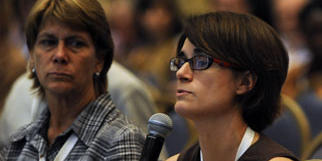Reporting from the Intergovernmental Platform on Biodiversity and Ecosystem Services

Isabel López-Noriega, a Legal Specialist at Bioversity International, reflects on the first meeting of the Intergovernmental Platform on Biodiversity and Ecosystem Services (IPBES), that took place last week in Bonn.
Isabel López-Noriega, a Legal Specialist at Bioversity International, reflects on the first meeting of the Intergovernmental Platform on Biodiversity and Ecosystem Services (IPBES), that took place last week in Bonn.
The idea of creating an international body that could generate the scientific and technical information needed for informed decisions on the conservation and use of biodiversity has been in the pipeline for many years. The gradual politicization of the scientific body of the Convention on Biological Diversity (CBD), and the success of the Intergovernmental Panel on Climate Change (IPCC) in making scientific information available to policymakers, are among the reasons behind the establishment of the Intergovernmental Platform on Biodiversity and Ecosystem Services (IPBES) in 2012.
Last week, the first meeting of the IPBES Plenary took place in Bonn. It was encouraging to see that all members of the Platform seem to agree on the key aspects of IPBES: independence, scientific authority and effectiveness.
However, how these aspects can be ensured, was subject to long discussions, where conflicting positions started to become evident such as:
- How should the relationship between IPBES, the United Nations and existing biodiversity conventions be constructed to ensure necessary connections but allow for the independence of IPBES?
- How could the Multidisciplinary Expert Panel (MEP) – the scientific core of IPBES – work so that autonomy and scientific rigor prevail over political interests?
- Who should be in this expert panel to ensure that different disciplines, ecosystems and regions of the world are well represented?
- What mechanisms can be put in place so that IPBES taps into both modern and traditional knowledge?
- How should different stakeholders interact with IPBES?
- How can it be governed effectively, and which UN agencies should be involved in its administration?
These are some of the many questions that delegates from around 130 countries, representatives of scientific organizations, NGOs and other stakeholders were trying to answer last week.
Of crucial importance to Bioversity International and the CGIAR research program on Water, Land and Ecosystems, is the involvement of stakeholders in the definition and implementation of the IPBES agenda. Bioversity scientists are engaged in collaborative research projects whose results will contribute to a better understanding of biodiversity’s status and trends, the ecosystem services biodiversity provides, and how it contributes to poverty alleviation, particularly with regard to agricultural ecosystems, species and genetic resources. This work should therefore be taken into account by IPBES when gathering new knowledge and translating it into policy recommendations. How and whether this will happen, will depend on the mechanisms put in place for stakeholder interaction and contribution.
Many, including myself, are still doubtful about the need and appropriateness of establishing IPBES in the first place. There is enough scientific information already available for different stakeholders to take informed actions towards the conservation and sustainable use of biodiversity. What I believe is missing is not the information, but the political will and collaboration to change things.
After attending the first plenary meeting of IPBES however, I feel a bit more positive about the platform. If the members manage to set up an international body that is independent, has scientific authority, and works efficiently; then the voice of science will be louder and clearer for those who have the capacity to make a difference in biodiversity conservation. On the other hand, the composition of the MEP makes me wonder if IPBES is moving in the right direction.
Some of the expert panel members selected in Bonn last week come from governmental agencies, perhaps too many of them. The agricultural sector and social sciences are underrepresented. Or should I say not represented at all? Many voices have also complained about the gender balance. Will these facts limit the potential of IPBES? As some delegates stated at the meeting last week: “IPBES is now a newborn baby that needs pampering”. I look forward to seeing how this baby grows up and turns into a responsible and sensible adult.
Isabel López-Noriega, Legal Specialist, Bioversity International
